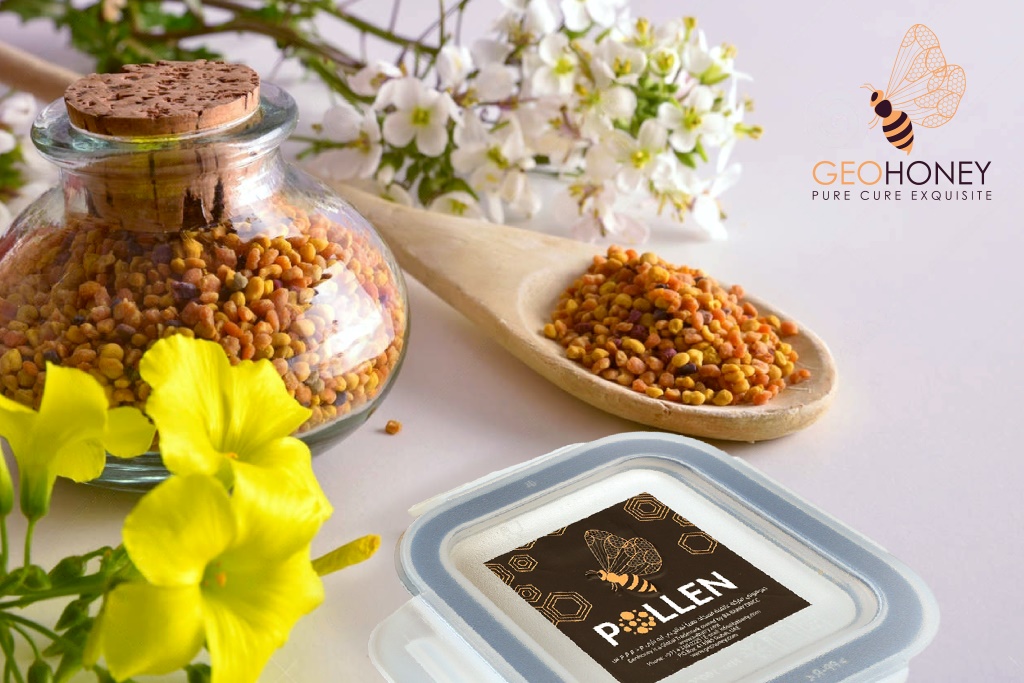- Tokyo: 23:16
- Singapore: 22:16
- Dubai: 18:16
- London: 14:16
- New York: 09:16
The Nutritional Benefits of Bee Pollen: Nature's Golden Treasure

Introduction
The buzzing of bees, the sweet scent of flowers, and the golden hue of pollen - all of these are synonymous with the beauty of nature. But did you know that bee pollen, nature's golden treasure, is also a nutritional powerhouse that offers an array of health benefits? As the bees fly from flower to flower, Bees collect pollen for protein and nutrient needs, while they gather nectar to make honey. The pollen they collect is used as a protein source for the bee colony.
This mixture of pollen, nectar, enzymes, and bee secretions contains an abundance of vitamins, minerals, and antioxidants, making it a veritable superfood. So, let's explore the wonders of this golden treasure of nature and discover how it can enrich our lives in more ways than one.
What is Bee Pollen Grains?
Bee pollen is a fine yellow powder that is collected from the male reproductive organs of bees. It is made up of millions of pollen grains from flowers, herbs, and trees. While pollen grains are a source of nutrition for bees, they are not exclusively a source of nutrition for each individual grain. Bees collect pollen from multiple flowers to meet their nutritional needs.
Bee pollen grains are made up of around 40% protein, which is higher than most common sources of animal-based protein. It also contains carbohydrates, minerals, vitamins, fatty acids, and bioactive compounds. The antioxidant content of bee pollen can help to reduce the risk of disease, support a healthy immune system, and protect against oxidative damage.
Nutritional Content
Bee pollen contains a wide range of vitamins, including vitamins A, C, E, and B vitamins. It also contains minerals like calcium, potassium, magnesium, and zinc.
As well as being high in protein, bee pollen is also a good source of essential fatty acids such as omega-3 and omega-6.
It also contains several bioactive compounds that can support cardiovascular health and reduce inflammation. These include apigenin, quercetin, kaempferol, and pinocembrin.
Overall, bee pollen grains are a valuable source of nutrients and contain plenty of vitamins, minerals, and antioxidants that can support overall health and wellbeing.
Health Benefits
Bee pollen is thought to have many health benefits and is used in many traditional remedies:
Its ability to aid digestion is due to the enzymes it contains, such as amylase, which helps break down carbohydrates, lipase that breaks down fats, and protease that breaks down proteins. This can help relieve digestive problems like constipation, bloating, and gas.
Bee pollen is also thought to have immune-boosting properties and some studies suggest that it can help reduce the severity of certain allergies.
It is also a rich source of antioxidants and can help reduce inflammation. The antioxidants can help reduce the damaging effects of oxidative stress, which is thought to contribute to many chronic diseases like heart disease and cancer.
Furthermore, bee pollen is thought to have neuroprotective activity, which can help protect the brain and reduce the risk of neurodegenerative conditions, such as Alzheimer’s disease.
Overall, bee pollen is thought to have many health benefits.
How To Use
Bee pollen can be used in many different ways:
It can be added to foods, taken in capsules or tablets, sprinkled over salads, yogurt or cereal, or even added to smoothies.
For those looking to supplement their diet with bee pollen, a typical dosage is between 1-3 grams per day, depending on your individual needs.
It is best to start with a lower dose and then increase as needed.
It can also be found in topical products, such as balms, facial creams, and lotions, which can be applied directly to the skin.
The pollen helps to retain moisture and is said to have antibacterial properties that can help reduce inflammation and improve skin health.
Lastly, those interested in taking advantage of the many purported health benefits of bee pollen should always buy high-quality products. Make sure to buy bee pollen from reputable sources like Geohoney to ensure purity and avoid potential contamination.
Some Possible Side Effects
It is important to note that, like most other supplements, consuming bee pollen can cause some side effects. Allergic reactions to bee pollen are possible, especially for individuals with pollen allergies. Allergies to bee pollen can cause more severe symptoms like nausea, abdominal cramps, hives, a runny nose, and a drop in blood pressure.
The Bottom Line
In conclusion, bee pollen grains are an absolute nutritional treasure. Its high levels of vitamins, minerals, enzymes, and antioxidants make it a great natural supplement. It can improve a person’s overall nutrient intake, as well as give their bodies a boost of energy and focus. But it is essential to take precautions if you use bee pollen, like speaking with a doctor first. People who are prone to allergies should always be careful when trying out new food or supplements.
With that said, buying bee pollen from Geohoney is a great way to give your body a nutrient boost and increase its intake of essential vitamins and minerals. So go ahead and enjoy its benefits while taking the proper precautions.



